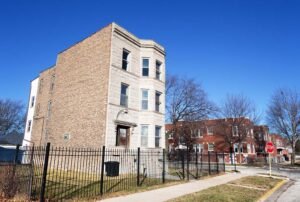October 23, 2016; TakePart (via AlterNet)
The Renaissance Community Co-op, founded to create and open a grocery store to provide healthy affordable food in Greensboro, North Carolina, recently held a soft opening of its new grocery store earlier this month. The neighborhood has been without a grocery store since 1998, when the last one shut down.
In 2015, the Greensboro-Highpoint area ranked number one in food insecurity in Guilford County. To help address this problem, the nonprofit Fund for Democratic Communities helped Renaissance Community Co-op organize and secure more than 900 community members as member-owners. Renaissance Community Co-op received $2.54 million in grants and loans to be able to launch the store.
The Co-op’s priorities, other than providing a place for the community to obtain healthy food, are affordable food prices and paying employees a decent wage. Employees earn $10 an hour, well above the state minimum of $7.25, and full-time employees will soon be eligible for health care benefits. The co-op also provides the potential for collaboration with other nonprofit organizations that are interested in providing nutrition education and cooking classes in the venue’s community room. Education, more than simply opening a store, is a critical component in addressing food insecurity.
The Renaissance Community Co-op is a first step in addressing widespread food insecurity in Guilford County, which has 24 food deserts. The USDA defines a food desert as a high-poverty area in which more than 500 people, or one-third of the community, reside more than one mile from a grocery store. In rural communities, a food desert is defined as residents in a high-poverty area living more than 10 miles from a grocery store. In these situations, people depend on the nearest corner store, which often does not stock healthy, nutritious food that is affordable. Food deserts contribute to health issues such as obesity, diabetes, and cardiovascular disease.
Sign up for our free newsletters
Subscribe to NPQ's newsletters to have our top stories delivered directly to your inbox.
By signing up, you agree to our privacy policy and terms of use, and to receive messages from NPQ and our partners.
Northeast Greensboro community members were continually disappointed by failed efforts to attract another large grocery store. However, by working with the Fund for Democratic Communities, community members learned that they could create a solution by opening their own grocery store. In addition to securing loans and grant funding to stock and open the co-op, community members provided funding by becoming member-owners themselves. By purchasing a $100 membership, community members are able to vote on how to make the store into what they want. The store was stocked based on not only member-owner input, but also as a result of a local resident survey.
Adding to the true community spirit of the endeavor, the building is rented to the Renaissance Community Co-op by another nonprofit. The Self-Help Venture Fund is a nonprofit organization that secures funds from foundations, faith-based organizations, corporations, and government sources. It bought the building from the city and has made the renovations to be ready for the co-op as well as other businesses. One of the benefits of this arrangement is that the Self-Help Venture Fund can offer a tenant, such as the Renaissance Community Co-op, an improvement allowance that is paid back through the lease.
An estimated 37,000 people who were affected by the food desert now have a place to purchase healthy and affordable food seven days a week. The soft opening of the store allowed the employees to work through any hiccups at the register and to get used to helping people find where things are in the store. The grand opening is scheduled for November 5th.—Kelley Malcolm
Correction: This article has been altered from its initial form. The Fund for Democratic Communities is not a member of the co-op proper; Renaissance received $2.54 million in grants, not $2.45 million; and as recruitment increased, the number of part-time employees did eventually exceed the number of full-timers—17 to 13. Thanks to Marnie Thompson of the FDC for helping us clear things up.













